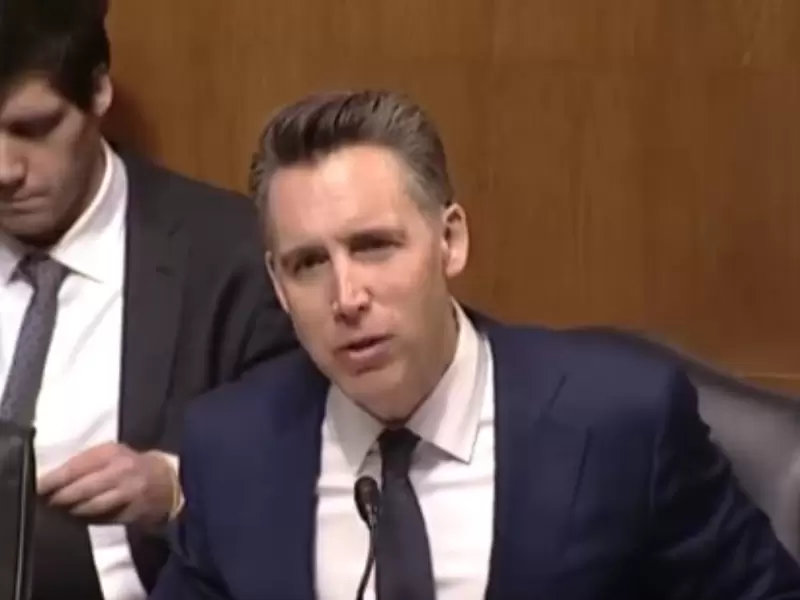US Senate Republicans push ahead on Trump's sweeping tax-cut, spending bill
The 940-page megabill would extend the 2017 tax cuts that were Trump's main legislative achievement during his first term as president, cut other taxes and boost spending on the military and border security.
.JPG) Senators Ron Johnson (R-WI) and John Kennedy (R-LA), U.S. Capitol., June 27, 2025. / REUTERS/Elizabeth Frantz
Senators Ron Johnson (R-WI) and John Kennedy (R-LA), U.S. Capitol., June 27, 2025. / REUTERS/Elizabeth Frantz
U.S. Senate Republicans planned to vote June 28 on President Donald Trump's sweeping tax-cut and spending bill after agreeing on changes to address concerns about funding for rural hospitals and the deductibility of state taxes.
Several Republican senators who had previously expressed hesitancy about voting for the bill told reporters that their concerns had been assuaged and that they were ready to vote to clear a first procedural hurdle in the coming hours.
Also Read: Trump cuts off US trade talks with Canada, shattering optimism over tariff deals
Senator John Barrasso, the chamber's No. 2 Republican, said the first procedural vote on the legislation would take place at 4 pm (2000 GMT).
The bill is Trump's top legislative goal. With his fellow Republicans controlling both chambers, Congress has so far not rejected any of Trump's priorities.
The 940-page megabill would extend the 2017 tax cuts that were Trump's main legislative achievement during his first term as president, cut other taxes and boost spending on the military and border security.
Nonpartisan analysts estimate that a version passed by the House of Representatives last month would add about $3 trillion to the $36.2 trillion U.S. government debt.
The Congressional Budget Office has not released a forecast for how much the Senate version - still subject to change - would add to the debt if enacted.
The nonpartisan Committee for a Responsible Federal Budget public policy organization on June 28 said its preliminary estimate is that the Senate version would add $4 trillion to the debt over the next decade, including interest costs.
"If you thought the House bill borrowed too much - and it did - the Senate manages to make things even worse," Maya MacGuineas, the group's president, said in a statement.
The White House said this month that the legislation, titled the One Big Beautiful Bill Act, would reduce the annual deficit by $1.4 trillion.
Democrats opposed the bill, saying its tax-cut elements would disproportionately benefit the wealthy at the expense of social programs relied upon by lower-income Americans.
"Future generations will be saddled with trillions in debt," said Senator Chuck Schumer, the Senate's top Democrat. "Under this draft Republicans will take food away from hungry kids to pay for tax breaks to the rich."
Republican Senators Josh Hawley of Missouri and Susan Collins of Maine, who had opposed concern about tax-code changes that could hurt rural hospitals, told reporters they were ready to move forward.
A successful vote would kick off a lengthy process that could run into Sunday, as Democrats unveil a series of amendments unlikely to pass in a chamber that Republicans control 53-47.
"By passing this bill now, we will make our nation more prosperous and secure," Senate Budget Committee chairman Lindsey Graham said in a statement accompanying the bill text.
MEDICAID CHANGES
Republicans from states with large rural populations have opposed a reduction in state tax revenue for Medicaid providers including rural hospitals. The newly released legislation would delay that reduction and would include $25 billion to support rural Medicaid providers from 2028 to 2032.
"If you want to be a working-class party, you've got to get and deliver for working-class people," Hawley told reporters. "You cannot take away healthcare for working people."
The legislation would raise the cap on federal deductions for state and local taxes to $40,000 with an annual 1 percent inflation adjustment through 2029, after which it would fall back to the current $10,000. The bill would also phase the cap down for those earning more than $500,000 a year.
That is a major concern of House Republicans from coastal states including New York, New Jersey and California, who play an important role in keeping the party's narrow House majority.
Republicans are using a legislative maneuver to bypass the Senate's 60-vote threshold to advance most legislation in the 100-member chamber.
NARROW PATH
The narrow majorities for Republicans in the Senate and House mean they can afford no more than three no votes from the party in either chamber to advance a bill that Democrats are united in opposing.
Democrats will focus their firepower with amendments aimed at reversing Republican spending cuts to programs that provide government-backed healthcare to the elderly, poor and disabled, as well as food aid to low-income families.
The bill also would raise the Treasury Department's debt ceiling by trillions of dollars to stave off a potentially disastrous default on the nation's debt in the coming months.
If the Senate passes the bill, it will then return to the House for another vote before Trump could sign it into law.
ADVERTISEMENT
ADVERTISEMENT
E Paper
Video




 Reuters
Reuters
.jpg)












Comments
Start the conversation
Become a member of New India Abroad to start commenting.
Sign Up Now
Already have an account? Login